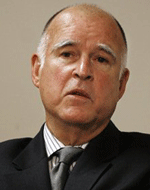 Governor Jerry Brown has been a bit different his second go-around as governor than he was his first time. Some of that is to be expected in the difference between a man in his 70s versus one in his 30s. But nowhere more stunning is the difference than on the death penalty.
Governor Jerry Brown has been a bit different his second go-around as governor than he was his first time. Some of that is to be expected in the difference between a man in his 70s versus one in his 30s. But nowhere more stunning is the difference than on the death penalty.
Back in March, Jerry Brown was interviewed by the San Francisco Chronicle Editorial Board and asked if he had “considered naming a panel to look at death row and recommend any cases deserving of a commutation.”
His response stunned many, “I don’t think we need a panel. There’s plenty of lawyers around that if they feel there’s such a case, they’re going to let me know about it.”
He continued, “As Attorney General, I think the representation was good. I think people have gotten exquisite due process in the state of California. It goes on for 20 or 25 years and to think that they’ve missed anything like they have in some other states, I have not seen any evidence of it. None. I know people say, ‘Oh, there have been all these innocent people,’ Well, I have not seen one name on death row that’s been told to me.”
While that was a stunning acknowledgment, and there is probably no way Jerry Brown could have possibly made that statement with enough knowledge of certainty, given that he had been attorney general, it is quite possible this was more about turf protection than a change of viewpoint on the death penalty.
After all, an Ohio blogger on the blog Gamso for the Defense relates the story of Caryl Chessman.
He writes: “In February 1960, Caryl Chessman was nearing the end of his almost 12 years on death row as the Red Light Bandit, convicted of a series of robberies, kidnappings, and rapes. Chessman said he was the wrong guy, and he fought for years over his sentence. In fact, his was the longest fight over a death sentence in US history to that point. And now it was almost over.”
But then a 21-year-old kid called his father.
“The kid was Jerry Brown. The father was Pat Brown, then-Governor of California,” writes Gamso. “Whatever convinced him, Governor Brown issued a 60-day reprieve. He didn’t commute the sentence, though, and in April Chessman was killed. (A federal court order granting a one-hour stay so the judge could hear last minute evidence that Chessman was innocent arrived moments too late.)”
But Jerry Brown was not done. Writes Mr. Gamso: “In 1968, he was among those holding a vigil outside the gates of San Quentin when Aaron Mitchell was executed. He was Governor when the California legislature passed a bill reinstating the death penalty. He vetoed it.”
And yet the same Jerry Brown last week, now governor again, sidestepped the issue of Proposition 34, telling David Siders of the Sacramento Bee: “I don’t know… You want to reinvent the world. But we have the world. And this is a matter that’s been before the voters … been before the Legislature. At this point in time, it’s relatively settled.”
Writes Mr. Siders: “The measure, Proposition 34, is on the ballot – and Brown wants no part of it. The Democratic governor has declined to say how he will vote on the death penalty or other ballot measures, and he is not expected to do so before Election Day. He said he is focused solely on his own initiative to raise the state sales tax and income taxes on California’s highest earners.”
Mr. Siders argues this “reflects the caution of a governor who has grown more sensitive to the limitations and political hazards of his office than when he was governor before, from 1975 to 1983.”
Back in 1992, Mr. Siders notes that Jerry Brown claimed his opposition to the death penalty was absolute.
The governor at that time proclaimed this. “When someone is contained in a cage, then to bureaucratically, coldbloodedly snuff out their life, whether by poison or by electrocution or by gas, it seems, it doesn’t seem right to me.”
According to Mr. Siders, Peter Finnegan, a long-time friend of the governor’s, going back to high school, said that they do not talk about the death penalty anymore.
“He just doesn’t want to talk about it,” said Mr. Finnegan. “You get nowhere talking about it, really, and it’s kind of behind him, and everyone knows where he is, and that’s that.”
Mr. Finnegan said, “He’s just more focused … . I just think he’s so much more mature.”
As attorney general he promised to carry out the law. And he did.
“I filed 330 briefs in support of death penalty convictions. That’s my job,” Mr. Brown said. “There’s probably no person in America who has fought to enforce the death penalty more than I have.”
“I will carry out the law,” Mr. Brown said, “without fear or failure and with fidelity to the will of the people.”
The governor has yet to face a clemency decision as governor.
The irony is that the death penalty which the governor spent most of his life, not only opposing but activel fighting against, has a chance to be defeated at the polls by the voters and the governor is silent.
“Proposition 34 would end the death penalty. Governor Brown the Younger can’t enact it. But he can support it. He can certainly vote for it. After all, he’ll be casting a ballot on Novermber 6 (if he hasn’t already done so absentee or early or whatever is possible in California),” Mr. Gamso writes. “And maybe he’ll vote for Prop 34. Or maybe not. He won’t say.”
He adds: “It’s not too late. The election is 30 days from tomorrow. Five seconds to answer a reporter’s question. About whether lifelong principles count. Or is he afraid the death penalty is the third rail? The voters could prove him wrong on that one.”
—David M. Greenwald reporting





The Devil is in the details of Prop 34.
Supporters claim trials will go faster if the death penalty isn’t involved: The result will be more wrongful convictions.
Prop. 34 is good business for private prisons – it’ll keep them full for the corporations to make a profit on each LWOP conviction, and these corporations can keep sending big contributions to politicians.
I hope Prop 34 fails, and that a better bill or proposition comes forth to eliminate the death penalty, ensure less prosecutorial misconduct, and provide more avenues to appeal wrongful convictions.
And get rid of private prisons for CA inmates.
Maybe after filing those 330 briefs it’s hard to admit you signed off 330 times on something you didn’t believe in.